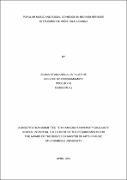| dc.description.abstract | This dissertation examines how popular music has contributed to the peaceful co-existence between South Sudanese refugees and host communities in Bidibidi Settlement (Yumbe District), West-Nile, Uganda. Besides, the study examines how popular music participates in mitigating some of the challenges refugee face as they interact with the host communities.
This study was inspired by the fact that despite many measures taken by different stakeholders towards the mitigation of refugee problems, the role of popular music towards the promotion of social cohesion between refugees and host communities in settlements like Bidibidi has not received adequate attention by scholars. Moreover, there is limited research on how popular music has facilitated the co-existence of refugees and host communities in Bidibidi Settlement, Yumbe district, West Nile, Uganda.
Adopting a case study approach under the qualitative research methodology, the study revealed that indeed popular music fosters social harmony between South Sudanese refugees and host communities in Bidibidi Settlement, West Nile. Through a program known as Bidibidi Got Talent (BGT), refugee popular artistes from South Sudan are identified and sponsored by UNHCR, OPM and Windle Trust, among other organisations, to have their music recorded in studios in Kampala. The recorded music is then played on Radio Stations covering the West Nile sub-region to sensitize communities about the need for peaceful co-existence. Since messages that are packaged through music can be interpreted differently by different people, I argue that the messages passed through popular music performed in this refugee settlement may also be interpreted differently by people depending on their socio-economic, political and religious context. | en_US |

